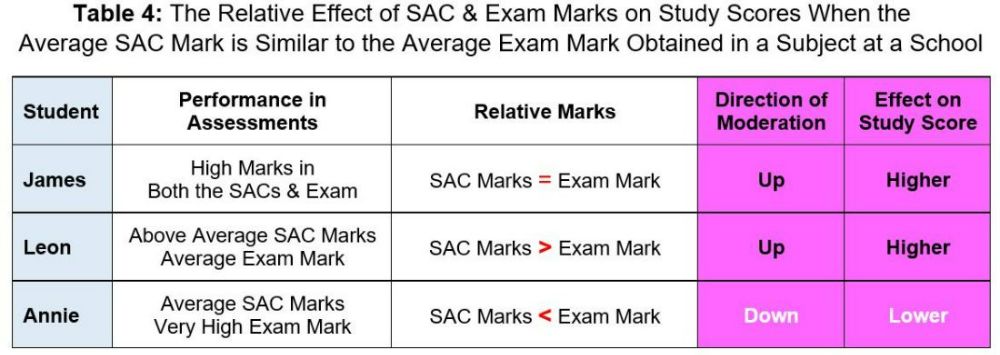How Your SAC Marks Can Dramatically Change Your Study Scores
Your SAC marks play a much bigger role than what most people assume, and can have a huge impact on your study scores. As an example, the table below shows the results obtained by two students studying the same subject (Chemistry) at the same school. Both students obtained an A+ in the final VCE exam, yet their study scores were very different – mainly because of the differences in their SAC marks.
Many students underestimate the importance of SACs placing greater weighting on their examination marks.
However, your SAC marks play a much bigger role than what most students believe, and they can have a huge impact on study scores. As an example, the table below shows the results obtained by two students studying the same subject (Chemistry) at the same school. Both students obtained an A+ in the VCE exam, yet their study scores were very different due to the differences in their SAC marks.

The information provided above is based on actual results obtained by students in recent years.
The same grades could result in different raw study scores.
As both Student 1 and 2 attended the same school and completed the same SACs under the same conditions, their SAC performance relative to each other can be fairly compared. However, depending on which school you attend, the SACs you complete may be easier or harder than those set by other schools. In a school where SACs are easier, students would receive higher marks than they would in a school where the SACs are more difficult. If the teachers at a school are ‘tough markers’, students would obtain lower marks than they would in a school whose teachers were ‘lenient markers’.
If these differences in marking and SAC difficulty aren’t taken into consideration, many students wouldn’t receive fair study scores.
To prevent students being penalised or favoured because of their choice of school, SAC marks are adjusted to reflect the marks obtained by the same students in the VCE exams*. This process, which is called moderation, relies on the assumption that each individual student should obtain the same marks for both their SACs and the corresponding subject exam.
Whether this actually happens in real life is basically irrelevant. The ‘powers that be’ have determined that the moderation process used in the VCE ensures “fairness and equity for all”.
* As every Victorian student enrolled in a given subject sits the same VCE examination at the same time, a student’s relative performance in these exams can be used to determine the SAC marks they would receive if every VCE student had completed the exact same SACs and the SACs were marked in exactly the same way.
So Exactly How Does Moderation Work?
Each school uses the SAC marks obtained in each VCE subject to rank their students by academic performance. For example, if you obtained the third highest Biology SAC marks at your school, your rank in this subject would be 3. If you also obtained the highest SAC marks in Chemistry, you would receive the top rank in Chemistry at your school (Rank 1).
Your SAC marks and rank in each subject are submitted to VCAA and are used to determine what your final or moderated SAC marks should be. It is these marks that are used together with your VCE exam marks to calculate your study scores. Note that your actual examination mark isn’t moderated, nor is it affected by your rank, or the rank given to your school.
VCAA arranges the exam marks obtained by the students at each school in decreasing order. Once again, students are given a rank in each enrolled subject that reflects how well they performed in comparison to the student who received the highest examination mark (by subject) at their school. Each student’s average SAC mark is then adjusted to equal the VCE examination mark that carries the same rank as your subject rank at school.
As it’s assumed that a student will get similar marks in both their SACs and their VCE exams, your moderated SAC mark becomes the exam mark obtained by the student whose exam rank is the same as your SAC rank.
For example, if your Biology rank at school is 7, your moderated SAC mark is adjusted to equal the 7th highest VCE Biology exam mark obtained at your school. If you ranked fourth in English at your school, your moderated English SAC mark would be adjusted to equal the fourth highest VCE English exam mark obtained at your school. If you rank first in any subject at school, you’ll get the benefit of the marks earned by the student who performed best in that subject on exam day!
Here’s an example that shows how your SAC marks can affect your study scores:

Notice how each student’s rank order for their Biology SAC marks is the same before (Table 1) and after moderation (Table 3)?
James:
| The results in Table 1 show that James’s performance in his Biology SACs earned him the highest rank in Biology at his school.
Irrespective of: (a) the mark he gets in the VCE Biology exam; James will be given the highest Biology examination mark obtained at his school as his moderated Biology SAC mark i.e. The mark in Table 2 that corresponds to Exam Rank 1 (98%). |
 |
Annie:
 |
Despite getting the lowest rank for her Biology SACs, Annie worked really hard and aced the VCE Biology exam. She keeps the mark she earned in the exam (98%) but unfortunately, her stellar result doesn’t improve her moderated SAC mark. As Annie ranked last in her Biology SACs, she’ll be given the lowest Biology exam mark obtained at her school as her moderated SAC mark.
Annie’s SAC mark drops from 71% to 63%, and unfortunately, it’s the lower value (63%) which is added to her exam mark to calculate her Biology study score. |
Leon:
| Leon obtained fantastic marks for his SACs but didn’t perform as well in his Biology exam. As he ranked second in his Biology SACs at school, his moderated SAC mark will be equal to the exam mark obtained by the student who got the second highest marks in the Biology exam. i.e. 92%.
Leon’s SAC mark increases from 84% to 92%, and of course, he keeps the mark he earned in the exam (63%). Leon’s strong SAC marks compensated nicely for his weaker performance in the Biology exam.
|
 |
How Does the Moderation Process Affect Study Scores?

The Moral of this Story
Don’t slack off during the year – put in as much effort into EVERY SAC as you can from the start of Term 1.
A high subject rank can quite easily make up for a weaker examination mark.
Working harder across the year so you can jump up a few rank spots in each subject could mean the difference between getting the ATAR you want and the result you actually get.
A Very Important Point
Your moderated SAC mark for a particular subject not only depends on your subject rank, it is also heavily influenced by how every student studying that same subject at your school performs in the VCE exams. i.e. Your school course group’s performance in the external exam will affect your moderated assessment mark for that course.
In summary:
The better your school-based subject peers perform in their VCE exams, the higher your study scores will be.
“Do well relative to your classmates in your SACs but work together as a class to all do well in the final exams.”
To maximise your study scores, your individual subject ranks must be high and your whole school course group must perform to the highest possible standard in the VCE exams.
Additional Note:
As your performance on the first SAC in each subject usually sets the tone for the rest of the year, it’s important that you do everything you can to maximise your SAC 1 marks. Lock in as many marks as you can with your first assessment, so the rest of the year doesn’t have to be more stressful as you try to regain the marks you lost at the beginning of the year.
In Summary:
Your subject ranks are more important than the actual marks you get for your SACs.
Your moderated SAC marks depend on your subject ranks AND how well the students at your school perform in the VCE exams.
Your average SAC mark is adjusted to equal the exam mark that carries the same rank as your subject rank at school.
Your moderated SAC marks are used together with your examination marks to calculate your study scores.
A high subject rank can make up for a weaker exam mark.
Working harder so you can jump up a few rank spots in each subject could mean the difference between getting the ATAR you want and the result you actually get.

What’s the Best Way to Maximise Your SAC Marks?
Once school has finished for the year, take a break for a few weeks, and then straight after Christmas, focus on doing everything in your power to maximise your SAC marks so you can secure the highest possible rank in as many subjects you can.
The fastest and most effective way to maximise your SAC results involves the following steps:
| Step 1: X X X |
Put some of your school holidays aside for study related activities. Every hour you spend getting ahead will greatly reduce stress levels and study loads when you return to school next year. Students doing one or more Unit 3|4 subjects should invest 2 to 4 hours each weekday towards their studies (1.5 to 3 hours each weekday if studing one or more Unit 1|2 subjects). X |
| Step 2: X |
Thoroughly work through the first Area of Study (AOS) from Unit 1 and/or Unit 3 before the start of Term 1, 2024. X |
| Step 3: X X |
Work through at least one trial SAC that resembles the SAC your school will use to assess the knowledge & skills relating to Outcome 1 (refer to the VCE Study Design for assessment details). X |
| Step 4: X X X X X X X |
Practice the problem-solving/application skills that are likely to be assessed in the first SAC.
Identify the key factors that differentiate A, B & C grade SAC responses. Determine how to make your SACs stand out – further boosting your SAC results and subject ranks. If you’re studying Unit 3/4 subjects, work through as many relevant past VCE exam questions as you possiblly can. Most test-based SACs are designed to test a student’s ability to apply their knowledge given unfamiliar applications, which is heavily assessed in the VCE exams. |
We get that it’s hard to find the motivation to study during school breaks, but if you don’t use the summer holidays wisely, you will, like thousands of past students, regret not taking this opportunity to decrease your stress levels, reduce your study-loads and to boost your VCE marks.
This is where our ‘VCE Summer School Head Start Lectures’ and our ‘VCE Master Classes’ can help you enormously.
Our VCE Summer School Head Start Lectures are specifically designed to help you maximise your Unit 1 and/or Unit 3 SAC marks, and secure the highest possible rank in your Unit 3 & 4 studies. Not only will every hour you invest improve your SAC marks, you’ll also reduce the time and effort you’ll need to prepare for your exams!
So come and join us at VCE Summer School and set yourself up with the best possible start to your final school year/s.
VCE Summer School 2024
Get Ahead. Reduce Stress & Study Time. Maximise VCE Marks.
Dates: Wednesday 10 to Tuesday 23 January 2024
Venue: The University of Melbourne (Parkville Campus)

Part 1: Unit 1 & Unit 3 Head Start Lectures
| Save 100’s of hours in study time! | |
| Get ahead & reduce stress & study in Term 1, 2024. | |
| Maximise SAC marks & subject ranks. | |
| Receive detailed A+ notes. | |
| Delivered by VCE exam assessors for VCAA. | |
| Get a huge advantage in your VCE! |
Part 2: SAC Attack Lectures
| Work through a trial SAC assessment (Outcome 1) step-by-step & maximise your subject ranks! | |
| Discover how to make your SACs stand out & earn the highest possible marks! | |
| Practice the problem-solving/application skills you’ll need to master. | |
| Study the sections of the SAC that are poorly addressed each year & investigate the opportunities that arise to boost your SAC marks. | |
| Learn what to include & how to craft answers/responses that would obtain full marks. | |
| Get valuable advice & unique suggestions to help make your SACs stand out – further boosting your SAC results & subject rank(s). | |
| Discover the key factors that differentiate A, B & C grade SAC responses. | |
| Learn how to convert a C grade SAC to a B & a B grade SAC to an A. | |
| Be alerted to potential areas of weakness & how these can be corrected before your first SAC is released next year. | |
| Learn how to use the time you spend preparing for your SACs in the most effective & beneficial way. | |
| Discover strategies you can implement now, so you can reduce stress levels & study loads before your SACs & exams. |
Here’s Some Great Advice from Past VCE Students
“Doing well in VCE is about consistent work the entire year, not just cramming in the last 6 weeks (and also making sure you put 100% into every SAC).”
“Your ultimate objective in VCE is to get a score high enough to get into your chosen degree. My advice, do whatever you can to achieve this. Put the hard work into every SAC and not just your exams.”
“Put the effort in to succeed, don’t be like me and have to take the hard road. I blew my sacs and I couldn’t get the atar to get me into the uni course I really wanted. Put in the hard work, persistence, and discipline. That’s what it takes.”
“I put in just as much effort, if not more, than most of the people at my school from the start of the year. The better you rank the greater your study scores are goin to be. You’ll have a buffer in the exams as well that will take away some of the pressure. There is no substitute for doing your best.”
And here’s some advice from the Year 12 Coordinator at a top-ranking school:
“Do well relative to your classmates in your SACs but work together as a class to all do well in the final exams.”



